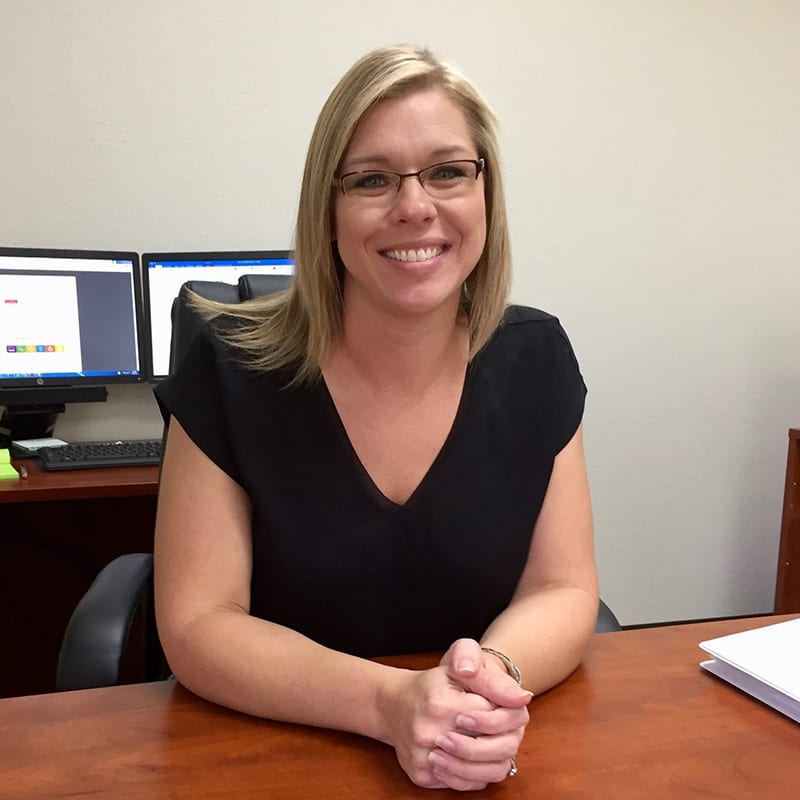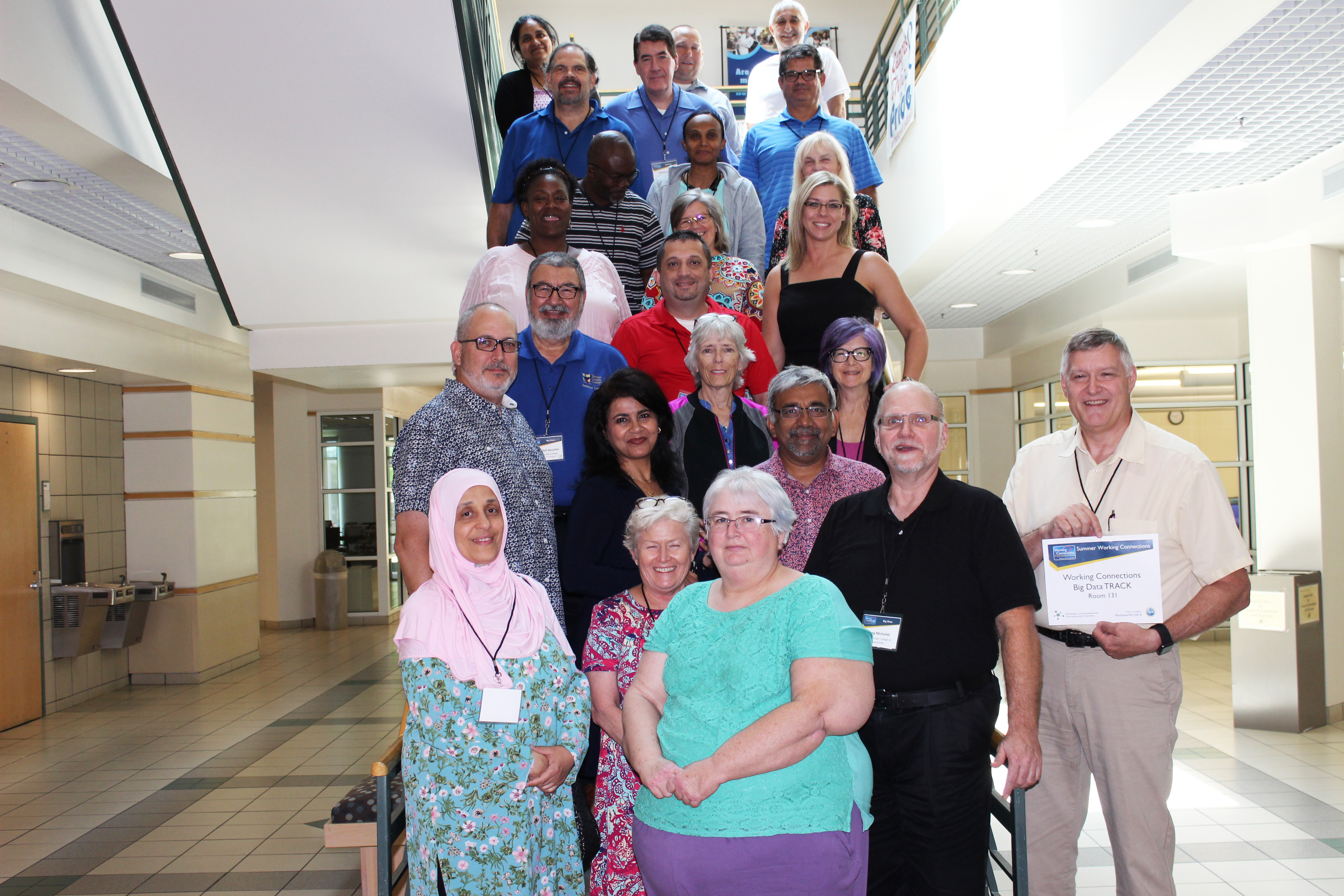CCN Focus: Heather Sanders, Midland College

Heather in her office at Midland Community College.
As a part of the National Convergence Technology Center (CTC) featured blogs, we would like to introduce to you some of our professors and instructors in the Convergence College Network (CCN) community. The CCN is a select cohort of community colleges and universities from across the country that connects IT educators with a wealth of resources to enhance their programs. In this week’s Q&A blog, we’re featuring Heather Sanders, Department Chair of Business Systems, Computer Science and Information Technology at Midland College in Midland, TX.
What do you teach? I teach computer science and information technology classes. I also help the bachelor program with their Management Information Systems courses. I have taught developmental math classes, we call them prep or EDUC classes, which are foundational college study skills type courses.
How long have you been a teacher? I’ve been at Midland College since 2012 and I started teaching in 2014 so I would say 6 years. I was an adjunct before that for the Developmental Math Program.
Did you have a job in the industry prior to teaching? Yes,I was working as an administrator of document control for a gas processing engineering firm; and quickly recruited to help with IT related tasks. My husband and I also had a few businesses – a concrete ready-mix plant, a commercial concrete construction business and a “hotshot” trucking business, which provided temp trucking services for businesses that need items delivered or moved to another location. They are usually vehicles or oversized equipment that normal delivery services cannot ship. I considered myself a stay-at-home mom for 16 years, but we also had the businesses. Other businesses contacted me if they needed help with anything computer related. Typically, these were businesses that my husband worked with that needed database systems created.

Heather pictured here (center) with Ernie Friend (left) and William Saichek (right) during their session at HI-TEC in St. Louis.
What sparked your interest in teaching? Right after high school, I needed a job, so I applied for an administrative assistant position at an edi (electronic data interchange) consulting business called Little Sys, Inc. The owner, Karen Raper, had contracts with Boeing North America, Rockwell, and Tri Star Trucking. She helped implement their standards by ensuring that they created the correct data and that it was organized in the correct order to be transmitted. She saw potential in me and believed that I could be a great asset for the company, so she sent me to college. Little Systems paid for my college degree and modified my work schedule around my school schedule. When work was slow, they allowed me to study. I had to pursue a degree in something that would benefit the company. While working at Little Sys and attending college, I was given a significant raise. After graduation, I no longer worked for the company. My family started growing, but I continued my education. I really struggled with it. The idea of working in IT with computers didn’t interest me a whole lot. I preferred to be “out and about,” but computers just made sense to me. Although it was challenging, I enjoyed it enough to pursue it. I tried horticulture while I was at the university and landscape architecture, only to return to computer science and math. My undergraduate and graduate degrees are in Computer Science, and I have a minor in Math. I graduated with my undergrad at University Texas Permian Basin, UTPB in Odessa, TX, and I received my master’s at the University of Illinois, Springfield.

Heather Sanders (right side, fifth row) amongst colleagues at the National Convergence Technology Center’s Summer Working Connections.
What is the secret to successfully teaching IT students? I really feel like you have to show how passionate you are about it. And I tell students, “this could be good or bad for you.” I would like for students to see how good it could be, but it requires them to dive in deep and work. I think by showing them my passion, they will get excited too. I don’t want them to say, “Oh gosh! I got to go to class and get through this,” because you’re training them for workforce, and you want them to enjoy what they’re doing. I really feel that’s important.
What is the biggest challenge in teaching IT? When you get clickers, student that you want to say, “Please just take your hand off the mouse and let’s think for a second of what’s going on.” That’s my biggest challenge, I’m a pretty patient person, but there’s a time when you got to say, “Okay, let’s think about this. What was your path to get where you are right now?” Teaching them that type of critical thinking skills is sometimes challenging, but they will get it.
And do you have a favorite class to teach? If so, why? I do. I really enjoy teaching programming to me it’s a lot of fun. I enjoy teaching students how important it is to be detailed in their documentation, because it makes sense right now, but if I come by or the person who wrote it looks at it later, they may question, “Oh, what was I doing?” That’s really important, especially if you’re in IT. You’re looking at someone else’s code trying to troubleshoot what’s going wrong. When I teach IT, I teach in the perspective of an IT person trying to troubleshoot. So, students learn how to code, but they learn more about debugging the code. They just need exposure to the layout so that they can troubleshoot those kinds of problems.
I also really enjoy teaching math. So many people are afraid of math and you just have to get very creative and explain what’s going on; what’s the point in learning this and what did I just find. I have programming students that will come up to me and say, “I was taking your programming class and you explain this math concept to me in programming, why didn’t they tell me that in math? Because that made so much sense.” And I say, “I don’t know why they didn’t tell you that in math, but that’s really what’s happening.” And they would say, “you really helped me not to have that fear.” Programming has all sorts of calculations.
What is the best thing about being a teacher? The best thing for me is those relationships you create with students. When I have a student that contacts me because they truly felt a connection and they’re comfortable coming to me. They need to be comfortable coming to us. We’re there to help them, and we want them to be successful. I don’t want them to be afraid to ask for help. I have what I call a “grand-student,” I had a student who was really struggling, and she ended up dropping out of college. I told her that I didn’t want her to feel guilty or think that I was going to judge her for doing that because college is going to be here. You have life and you need to take care of that. She, later, called me and said, “I’m getting ready to have a baby and I want you in the delivery room,” because she was scared. So, I was there and now I have a “grand-student” her name is Arabella, she just turned three. I have pictures of her at her birthday party a couple of weeks ago. I was there for her (mother) and I was glad that she thought of me to be there for her.
I had another student that was getting married and asked me to come to her wedding. I said,
“Sure, I would love to come to your wedding.” The wedding was in Mexico so I let her know that I couldn’t attend. And she said, “Well what if we had it in Midland (Texas)?” And so, she had it in Mexico and she also had one in Midland. I was there (Midland) and she was so excited to see me. While she was taking her wedding photos, she popped into the reception and said, “Mrs. Sanders could you please come and be in one of our wedding photos?” Just those little things are rewarding.
What advice would you give an IT student that is about to graduate and enter the workforce? Be social, they really struggle with that. We (individual in IT) have to work on being comfortable talking to other people and networking. We are very comfortable being alone. They need to push themselves outside of their comfort zones, because they’re going to learn a lot more by being social. And they should learn how to communicate in laymen’s terms, not using terminology that no one else knows. There are so many acronyms in IT that sometimes I don’t know what a student is talking about and I’m not sure if they know.
How do you keep up with the ongoing evolution of IT? It’s difficult and it’s overwhelming, but I try by listening to what others are saying and by reading articles.
Heather was also featured in Midland Community College publication, if you would like to read more about her experience as an IT instructor, checkout the article here.
